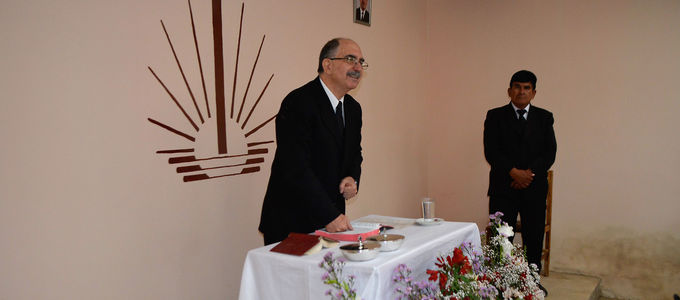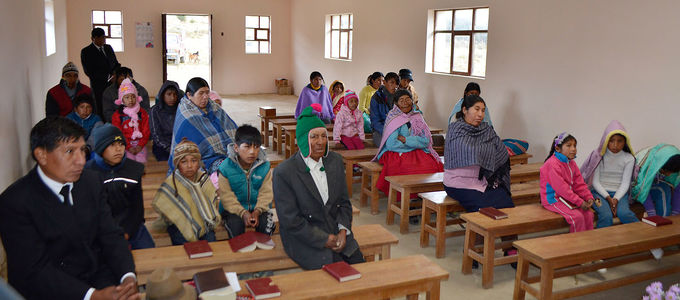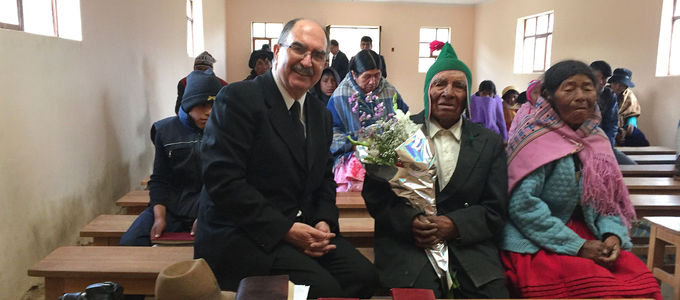
This is not a congregation you happen to come across as you stroll along. In fact, at 4,000 metres it is about as close to heaven as you can get. But Pacharía has a lot more to offer: a Deacon well past retirement age and an ingenious way of calling the faithful to worship.
Pacharía is situated at exactly 4,055 metres above sea level, making it the highest New Apostolic congregation in the world. Fifty members call this congregation in the Andes home: 300 kilometres east of the Pacific and 140 kilometres from La Paz (Bolivia), high up in the mountains.
Llamas, sheep, and ships
There is plenty to see in the province of Omasuyos: mountains, meadows, llamas. But if you hope to find large numbers of people you will look in vain. Instead you hear and see flocks of sheep, which are kept and tended by the inhabitants of the highlands. Another thing you see is one or the other big ship.
Not far from Pacharía is Lake Titicaca, the second largest lake in South America. Because of its altitude it is also called “lake in the clouds”. Its northwest-to-southeast direction is about 178 kilometres and it is about 76 kilometres across at its widest point. The lake sits astride the border between Peru and Bolivia. Situated at 3,812 metres above sea level, it is the world’s highest lake navigable to large commercial vessels.
The village of Pacharía is comprised of small houses that are spread over the plateau. There is neither electricity nor running water. Communication with the outside world is difficult at best and sometimes impossible. The brothers and sisters walk to church over rugged mountain trails, up to a distance of four kilometres.
Retirement at 85
At the end of December 2016, District Apostle Raúl Montes de Oca visited his brothers and sisters in Pacharía. He was accompanied by ministers from the capital. Everyone enjoyed the fellowship and the divine service. There were joyful encounters with the children and the older members, directly in the clouds.
There was, however, also a little bit of sadness: the only Deacon of the congregation, Cecilio Mamani, was placed into retirement—at 85. “We nearly had to postpone the retirement,” District Apostle Montes de Oca said: “Shortly before we arrived, we received the information that the Deacon was not home. He is a shepherd and was further up in the mountains with his sheep.” In the end, everyone was there for the service, including the Deacon.
The congregation will now be cared for by the ministers from the neighbouring congregation of Villa Bolívar, which is close to La Paz, 140 kilometres away. Divine services in Pacharía are celebrated on the first and third Sunday of the month. The sermon in Spanish is simultaneously translated into Aimara, one of the official languages in Bolivia.
Community life
There is no religious instruction and Sunday School in Pacharía. “We don’t have any teachers,” the District Apostle explains. “That is why we still have not managed to draw up a curriculum.”
Village meetings, which are usually organised at short notice, often disrupt the life of the New Apostolic congregation. The brothers and sisters in Pacharía, like the majority of Bolivia’s population, belong to the indigenous peoples. Decisions concerning everyday life and their coexistence in the village are taken together. These village councils are often announced at the last minute and require the presence of the men—regardless of whether a divine service is scheduled.
A bell summons the people to worship
The men in Pacharía bring their sheep to pasture high up in the mountains. When the Priest sounds the “bell” to summon the faithful, the brothers hurry down the mountain to service. It is not really a bell that the Priest strikes, but an iron, whose sound everyone is familiar with.


















